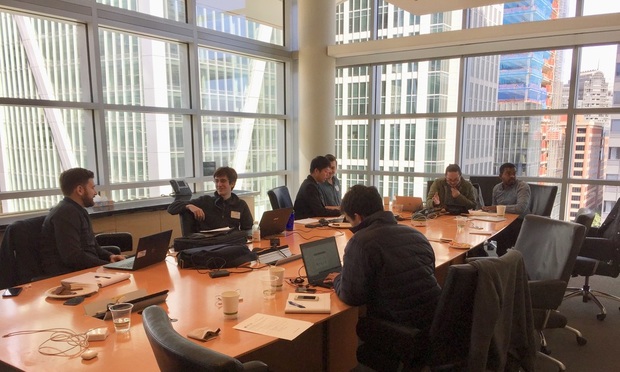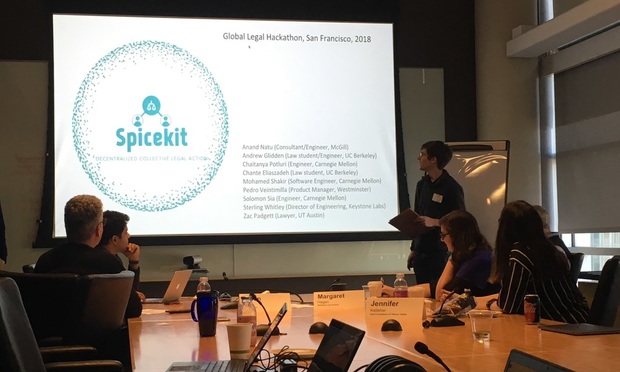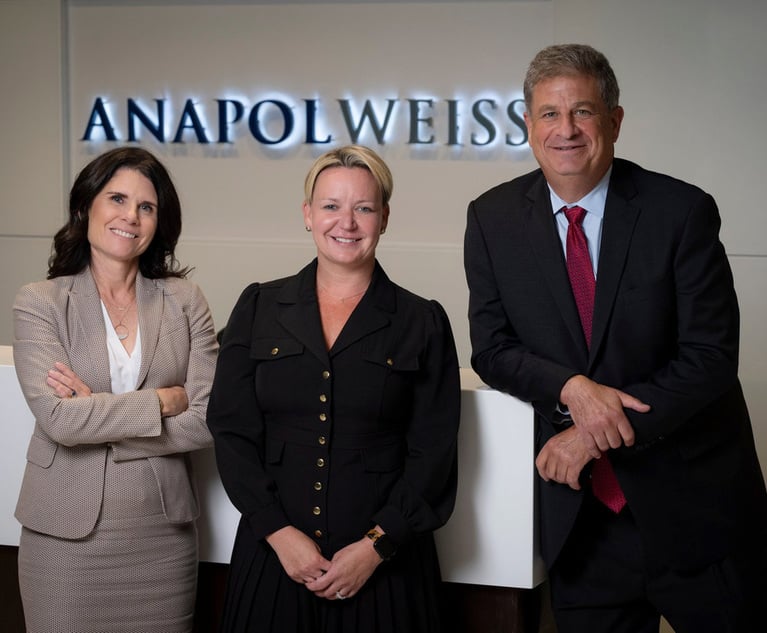Lawyers, Developers Team Up in Hackathon to Revamp Legal Industry
The winning team of a “Global Legal Hackathon” recently hosted by Orrick, Herrington & Sutcliffe aims to provide a platform to fund and expedite class action suits using blockchain technology.
February 27, 2018 at 04:38 PM
4 minute read

The winning team of the recent “Global Legal Hackathon” hosted by Orrick, Herrington & Sutcliffe in San Francisco seeks to provide a platform to fund and expedite class action suits using blockchain technology.
The nine-member group, consisting of an Orrick lawyer, two law students and six engineers and developers, came together on Feb. 23 at Orrick's San Francisco office to participate in a worldwide hackathon designed to create concepts and technical solutions to address justice and law practice issues.
“It is not that the legal industry is reluctant to adopt the technologies, it's just the design problems the legal industry faces are much harder,” said Mohamed Shakir, who brought with him a team of five engineers and designers from consulting firm Keystone Strategy LLC. Shakir is a technical engagement manager and head of Keystone Labs.
Zac Padgett, a managing associate at Orrick in Portland, Oregon, echoed Shakir's sentiment.
“The legal industry is not immune to disruption,” he said. “The industry, just like other established industries, is susceptible to technology. Change is inevitable [and] it is time to focus on it.”
Andrew Glidden, a law student at the University of California, Berkeley, and head of legal research at Blockchain@BerkeleyLaw, said that the structure of private law firms doesn't put them in the best possible position to invest in new technologies.
“Lawyers definitely want to be innovative and don't always have the market structure or the technological help that they need to make that happen,” Glidden added. “So, an event like this that focuses on building out legal technologies is so important for our work.”
Together, Glidden, Padgett, Shakir and other legal and technology enthusiasts formed a team called the Spicekit. Their idea was to build a decentralized platform that enables individuals to create a bounty to incentivize lawyers to pursue class action suits, such as potentially fraudulent initial coin offerings.
 “Our platform is mostly targeted to these class action suits that are not 'traditionally' attractive to this big financial firm,” Shakir explained.
“Our platform is mostly targeted to these class action suits that are not 'traditionally' attractive to this big financial firm,” Shakir explained.
Spicekit was one of the four teams that joined the competition in San Francisco. The Global Legal Hackathon, which took place from Feb. 23 to Feb. 25, was held simultaneously in 40 cities across six continents.
Orrick of counsel Jason Somensatto in Washington, D.C., who mentors the teams in San Francisco, said the hackathon is the first global-scale event the firm has engaged in that brings together legal and technology professionals to compete with one another to develop legal technology solutions.
“This is probably one of the first opportunities for big firms to really put their toe in this water, on an area that has been a smaller group before today,” he said.
A panel of experts including Owen Byrd, general counsel and chief evangelist at LexisNexis Group-owned legal analytics provider Lex Machina Inc., Margaret Hagan, director of the Legal Design Lab at Stanford Law School, and Jennifer Kelleher, directing attorney at the Law Foundation of Silicon Valley, acted as judges for hackathon-related pitches.
The runner-up team, Justice League, designed a system called Circuition to bring clarity and transparency to the legal process by allowing clients to see the progress a lawyer has made on a particular case. Tied for third, team A2J.AI, created a chatbot using artificial intelligence technology to help simplify document procedures for litigants dealing with domestic violence, while keeping sensitive information private. TeamGiga pitched a system named RΞSOLV that uses blockchain technology to create a globally distributed contract dispute resolution network for mediators. TeamGiga also won the Hadfield Challenge Award for creating a new model of dispute resolution.
“I hope some of the vision will continue and maybe [they'll] start a company themselves,” said Shawnna Hoffman, another mentor to the teams and a global cognitive legal co-leader at International Business Machines Corp.
The Spicekit squad will go on to compete in the second hackathon round online, and the global winner will be announced on April 21 after final presentations in New York.
This content has been archived. It is available through our partners, LexisNexis® and Bloomberg Law.
To view this content, please continue to their sites.
Not a Lexis Subscriber?
Subscribe Now
Not a Bloomberg Law Subscriber?
Subscribe Now
NOT FOR REPRINT
© 2025 ALM Global, LLC, All Rights Reserved. Request academic re-use from www.copyright.com. All other uses, submit a request to [email protected]. For more information visit Asset & Logo Licensing.
You Might Like
View All
Once the LA Fires Are Extinguished, Expect the Litigation to Unfold for Years
5 minute read

Faegre Drinker Adds Three Former Federal Prosecutors From Greenberg Traurig
4 minute read
Anapol Weiss Acquires Boutique Led by Star Litigator Alexandra Walsh
5 minute readTrending Stories
- 1Decision of the Day: Judge Dismisses Defamation Suit by New York Philharmonic Oboist Accused of Sexual Misconduct
- 2California Court Denies Apple's Motion to Strike Allegations in Gender Bias Class Action
- 3US DOJ Threatens to Prosecute Local Officials Who Don't Aid Immigration Enforcement
- 4Kirkland Is Entering a New Market. Will Its Rates Get a Warm Welcome?
- 5African Law Firm Investigated Over ‘AI-Generated’ Case References
Who Got The Work
J. Brugh Lower of Gibbons has entered an appearance for industrial equipment supplier Devco Corporation in a pending trademark infringement lawsuit. The suit, accusing the defendant of selling knock-off Graco products, was filed Dec. 18 in New Jersey District Court by Rivkin Radler on behalf of Graco Inc. and Graco Minnesota. The case, assigned to U.S. District Judge Zahid N. Quraishi, is 3:24-cv-11294, Graco Inc. et al v. Devco Corporation.
Who Got The Work
Rebecca Maller-Stein and Kent A. Yalowitz of Arnold & Porter Kaye Scholer have entered their appearances for Hanaco Venture Capital and its executives, Lior Prosor and David Frankel, in a pending securities lawsuit. The action, filed on Dec. 24 in New York Southern District Court by Zell, Aron & Co. on behalf of Goldeneye Advisors, accuses the defendants of negligently and fraudulently managing the plaintiff's $1 million investment. The case, assigned to U.S. District Judge Vernon S. Broderick, is 1:24-cv-09918, Goldeneye Advisors, LLC v. Hanaco Venture Capital, Ltd. et al.
Who Got The Work
Attorneys from A&O Shearman has stepped in as defense counsel for Toronto-Dominion Bank and other defendants in a pending securities class action. The suit, filed Dec. 11 in New York Southern District Court by Bleichmar Fonti & Auld, accuses the defendants of concealing the bank's 'pervasive' deficiencies in regards to its compliance with the Bank Secrecy Act and the quality of its anti-money laundering controls. The case, assigned to U.S. District Judge Arun Subramanian, is 1:24-cv-09445, Gonzalez v. The Toronto-Dominion Bank et al.
Who Got The Work
Crown Castle International, a Pennsylvania company providing shared communications infrastructure, has turned to Luke D. Wolf of Gordon Rees Scully Mansukhani to fend off a pending breach-of-contract lawsuit. The court action, filed Nov. 25 in Michigan Eastern District Court by Hooper Hathaway PC on behalf of The Town Residences LLC, accuses Crown Castle of failing to transfer approximately $30,000 in utility payments from T-Mobile in breach of a roof-top lease and assignment agreement. The case, assigned to U.S. District Judge Susan K. Declercq, is 2:24-cv-13131, The Town Residences LLC v. T-Mobile US, Inc. et al.
Who Got The Work
Wilfred P. Coronato and Daniel M. Schwartz of McCarter & English have stepped in as defense counsel to Electrolux Home Products Inc. in a pending product liability lawsuit. The court action, filed Nov. 26 in New York Eastern District Court by Poulos Lopiccolo PC and Nagel Rice LLP on behalf of David Stern, alleges that the defendant's refrigerators’ drawers and shelving repeatedly break and fall apart within months after purchase. The case, assigned to U.S. District Judge Joan M. Azrack, is 2:24-cv-08204, Stern v. Electrolux Home Products, Inc.
Featured Firms
Law Offices of Gary Martin Hays & Associates, P.C.
(470) 294-1674
Law Offices of Mark E. Salomone
(857) 444-6468
Smith & Hassler
(713) 739-1250






